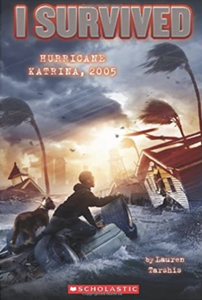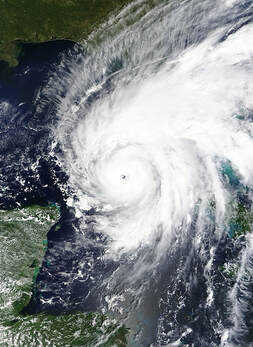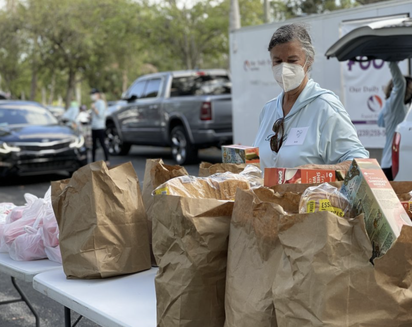 In I Survived Hurricane Katrina, ten-year-old Barry dreams of being a superhero. His alter-ego “Akivo” accesses his superpowers through his pinkie and a star that sends special energy to guide him. When the young boy is swept away from his parents in crushing flood waters, he clings to an oak tree, a dislodged house, a grateful dog, and ultimately, to his hope of being reunited with his family. But he does more than cling: he shimmies up the oak, makes a leap for the house, unchains a whimpering dog tied inside, seeks out a dry patch of roof, and with the dog (named Cruz) waits for rescue. Barry’s is a fictional odyssey set during 2005’s Hurricane Katrina, which took the lives of more than a thousand New Orleanians. Lauren Tarshi tells the story well, and in persevering, the child comes to recognize both his own strength and what it means to have companions for the journey. He doesn’t go it alone. He literally embraces his cross (Cruz) and finds his way to safety and family.  Hurricane Ian, 2022. (NASA) Hurricane Ian, 2022. (NASA) In the last month, as Hurricane Ian bore down on the southwest Florida coast, many more have had the chance to persevere in the face of life’s literal storms. Preparing for disaster. Attempting escape. Enduring the wrath of wind and water. Living in fear and hope. Sinking, swimming, then, with luck, picking up the shattered pieces to move on. Some of us inadvertently persevered. The storm changed course at the last minute and when Naples became a mandatory evacuation zone on Tuesday evening, my husband and I decided to drive to Miami, ninety miles east where we had friends. It was getting dark. The storm wouldn’t make landfall till the next morning, but when we turned on to I-75, Ian was already upon us. The drive along “Alligator Alley” was white-knuckle terrifying, like driving through a carwash. No lines visible on the side of the road. Can’t we get these windshield wipers to go any faster? We hitched our star to an emergency vehicle right in front of us and could make out his rear lights well enough to just follow and pray. We'd go through bands of fifteen minutes and then get a break. Then back into it. After breaking into the "clear" in one stretch, a loud beep emanated from our phones announcing, "tornado alert -- seek cover immediately." There was nowhere to seek cover, but my husband moved into the left lane, and said "I just want you to know if there's a tornado, I'll steer us down into the ravine median since that's a low point. We're not out of control - that's our plan.” Us and the alligators, flashed through my mind. Fortunately, said tornado did not arrive. And three hours later, we swished our way to Miami. My husband was the inadvertent poster child for perseverance that night. He piloted us through three hours safely. Throughout the drive I could hear my granddaughter shouting at me, “Perseverance is not my best virtue!” During the summer I’d urged her to summon that excellence and keep swimming towards me across what to her seemed an impossibly long stretch of bay. She made it. A short swim. Like our short drive. But now the real work of perseverance begins for so many. Starting from scratch. Rebuilding. Summoning reserves of resolve, diligence, and hope. Staying focused for the long haul as we work to restore homes, businesses, and lives. It’s hard to persevere when life has become a mucky slog, rather than a terrifying adventure.  For many, it’s about waiting an hour in their overheated cars in ninety degree weather as they queue up for food. Yesterday, in one part of Naples, Our Daily Bread, Al’s Pals, and the Salvation Army gave out more than 300 free meals, bags of food, and grocery store gift certificates for families ranging from two to ten people. Families who’d lost their homes, their livelihoods. Many of them had English as their second language. The lines stretched out the high school parking lot and moved at a snail’s pace. But people waited and received with gratitude and good grace. I have had stellar examples of perseverance in my life. My mother was a prisoner of war during World War II, and for three years endured captivity, disease, cruelty, and starvation in a Japanese internment camp in Manila. She was full of stories about enduring and outwitting hunger (she kept a recipe book) and boredom (though study and shows), surviving diphtheria and beriberi, and occasionally outwitting their captors. She weighed ninety pounds when liberated and stood 5’4. In 2015 I attended a seventieth anniversary event for the liberation of the camp, and a high school student asked one of the surviving internees (then in her late 80s) whether she or others had been tempted to suicide in the face of such a struggle. The girl admitted that she herself sometimes had suicidal thoughts and had endured no such tragedy. Mrs. Bennett looked surprised at the question. “No, no, we didn’t,” she said. “I don’t know anyone who thought of suicide. We had each other and we never lost hope. We knew, we just knew our boys would come and liberate us.” And they did. Perseverance is not a flashy virtue. It's about putting one foot in front of the other again and again -- hour after hour, day after day, and sometimes year after year. But, as Joan Bennett reminded us, perseverance is closely related to hope. And friends along the way. Barry had the hope of finding his family and the companionship of Cruz. Internees had the hope of freedom and the unfailing support of each other. The Hispanic and Haitian-born Naples needy have the perennial hope of the American dream, a better life in this new country they’ve adopted, and they’ve got the help of each other, along with volunteers and organizations who roll up their sleeves and say “we’re all in this together.” So, to quote a sage, “let us persevere in running the race that lies before us.” Mary Beth Klee Naples, Florida To contribute to Florida disaster relief, your help is needed at https://www.volunteerflorida.org/donatefdf/ To read more from Telling Our Stories, visit our Blog Archives page. |
AuthorWrite something about yourself. No need to be fancy, just an overview. Archives
July 2024
Categories |
